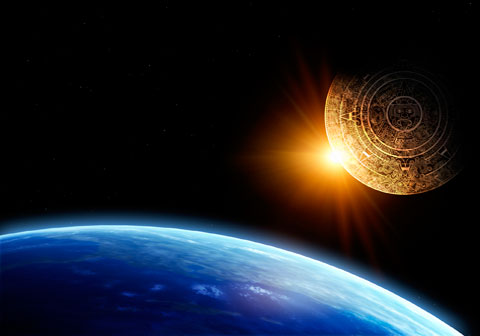
Buy Now – The End is Near

Is there something in our DNA that gets excited by the idea of terminal events? Do limitations on time really make a potential reward seem more valuable or attractive? Good marketing and advertising should always feature a call to action; direct marketing needs to supplement that call with a sense of immediacy – act now or else!
Happy New Year to everyone! It should be a particularly happy one, too, since the world refused to end on December 21, 2012, as the Mayans predicted (along with Nostradamus, Edgar Cayce, the Bible, and scores of other sources if you believe the End of Days crowd). No polar shift, no collision with Planet Nibiru, no “hidden asteroids” freed by the galactic alignment. Nada. Waking up on December 22 must have incited a pretty frantic Christmas shopping rush among the true believers.
For the sake of transparency, I should admit that I am writing this well before that supposedly fatal date, confident that you will be around to read it in 2013. If the Mayans were really that good at predicting the future, would they have wasted time creating a calendar that would last about a thousand years longer than they did? Their “Long Count” calendar goes the other way too – back to the beginning of the last “creation cycle”… August 11, 3114 B.C. to be exact. That’s when the previous cycle ended and world was renewed. While this was long before the birth of the Mayan culture, the world-changing event managed to squeak by without stirring up too much notice in ancient Egypt, India or China.
We do, however, appear to have a morbid fascination with the end of the world. From the mythological Norse Ragnörk to the Book of Revelations, it’s hard to find a faith-based tradition that doesn’t include a scenario for terminating the human race, the planet, and/or the universe – generally in some nasty, unattractive way. The Mayans were pretty tame on this count. They described a cataclysmic flood (ho-hum) without attributing it to any particular date. Hollywood has done much better – and done so repeatedly. We never get tired of the subject, whether as entertainment or, for some of us, a titillating obsession.
It makes sense, I suppose, for each religion to have its own version of creation, but why did the priestly class spend so much time dreaming up one far-off apocalypse or another? Motivation is the only thing that occurs to me. A looming terminal event provides incentive for obeying to the tenets of the faith and maintaining its attendant rites (not to mention job security for the crafty shaman). The goal may be to forestall the event through appeasement (e.g., toss a few more virgins into the volcano), to achieve some form of salvation, or to move on to the next cycle of reality with a spiritual leg up on the competition. Adherents remain faithful through fear of missing out on some future reward. The ancients, apparently, understood a bit about direct marketing.
What does primitive eschatology have to do with direct marketing? They share the need to inspire action by putting the audience under a chronological gun. In commerce we use the threat of missing out on an experience, a purchasing opportunity, or an attractive deal. How many times a week do you hear: “Hurry while supplies last”… “This is a limited time offer”… “Call in the next 20 minutes and we’ll double the offer!” Then, of course, there’s the inventory countdown on the TV shopping networks that lets us know how quickly time and merchandise are running out. Good marketing and advertising should always feature a call to action; direct marketing needs to supplement that call with a sense of immediacy – act now or else!
What I find amazing is that this stuff actually works, despite the fact that most, if not all of us, realize that these artificial deadlines are outright misrepresentations (okay, lies). When Vince from ShamWow tells us to order right now because, “we can’t do this all day,” we know he’ll be doing it all day, all week, and as long as there’s product left to sell. When a commercial claims that the bonus products they’ll include with our $19.99 order are a $100 value, do we really believe them? And when we hear that an offer is being extended because of “popular demand”, we surely understand that this is code for: “we still have junk left in the warehouse.” Or do we? The success of the direct marketing industry would seem to indicate otherwise.
Is there something in our DNA that gets excited by the idea of terminal events? Do limitations on time really make a potential reward seem more valuable or attractive? Whether it’s Howard Camping proclaiming liftoff dates for the Rapture or good old Vince hawking cleaning towels, putting something “on the clock” seems to be a powerful motivator for many of us.
No, the world didn’t end in December. Neither did direct-to-consumer television spots, infomercials and the Home Shopping Network. Sometimes you just have to accept the bad with the good.

